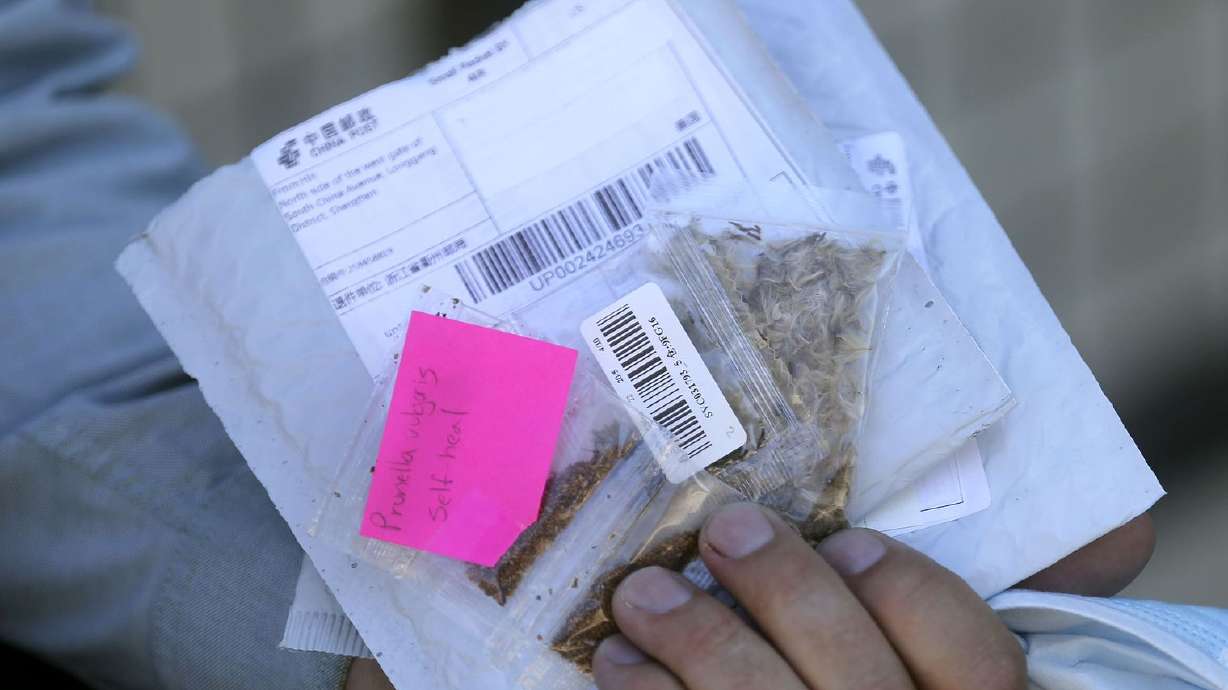Estimated read time: 3-4 minutes
This archived news story is available only for your personal, non-commercial use. Information in the story may be outdated or superseded by additional information. Reading or replaying the story in its archived form does not constitute a republication of the story.
SALT LAKE CITY — Thousands of packages of unsolicited seeds from China are being sent to every state across the nation, prompting an intense investigation from federal and state agricultural agencies that are not only urging the public to refrain from planting them, but advising strict protocols for their destruction.
Robert Hougaard, director of the Utah Department of Agriculture and Food’s Plant Industry Division, said his inbox for email lit up over the weekend with new inquiries from Utah residents who had received the unsolicited packages.
Residents in all corners of the state — from San Juan County to Box Elder County’s Grouse Creek — are receiving the packages, he said, adding the agency has handled close to 200 inquiries.
The Utah State University extension service has also been inundated with questions from concerned residents, so Hougaard said the extent of the problem is widespread.
“We have even heard that people have planted them, consumed them and they didn’t know what it was,” he said.
The state agency raised the alarm last week as the seed scheme started to spread. At that point, officials knew of 14 states, but that number has since grown.
“I am pretty sure every state has received some,” he said.
People have been dropping off the unsolicited packages at the agency at 350 N. Redwood Road in Salt Lake City, where it has installed a drop box.
If people are unable to bring in the seeds, the federal government has issued new protocols for their destruction.
Seeds must be baked in a preheated oven at 325 degrees on a sheet lined with foil for 30 minutes. After they cool, they are to be put in a sealed bag and then double bagged and disposed of in a non-green waste trash can.
If the seeds have been planted, they need to be removed from the ground, according to the U.S. Department of Agriculture, as well as 3 inches of soil deep and across.
Related:
The agency is advising to place plant and soil material inside the thickest plastic bag available. People should squeeze as much air out of the bag as possible, seal the bag and place it inside a second bag — again with as much air squeezed out and then sealed. The double-bagged material should be put in the trash and not composted.
Residents should also refrain from planting any new plants in that same area for a year.
“It seems scary, but it is normal protocol with something unknown,” Hougaard said.
The federal agricultural agency’s Animal and Plant Health Inspection Service announced Monday it is collecting as many seed packages as possible to determine whether they present a threat to U.S. agriculture or the environment.
People can go to its webpage to review a question and answer document to support its effort.
Both Hougaard and the federal agency said so far, nothing has been determined to be a threat, but if invasive plants are part of the mix it could be extremely detrimental to the country.
Investigators are trying to get answers for the unusual scheme.
“At this time, we don’t have any evidence indicating this is something other than a “brushing scam” where people receive unsolicited items from a seller who then posts false customer reviews to boost sales,” the federal agency said in a statement. “USDA is currently collecting seed packages from recipients and will test their contents and determine if they contain anything that could be of concern to U.S. agriculture or the environment.”










